 newsitems
newsitems  CoE Chair, Armenian D. Prime Minister Gevorgyan to EuroFora: The most Important is Local Democracy !
CoE Chair, Armenian D. Prime Minister Gevorgyan to EuroFora: The most Important is Local Democracy !
CoE Chair, Armenian D. Prime Minister Gevorgyan to EuroFora: The most Important is Local Democracy !
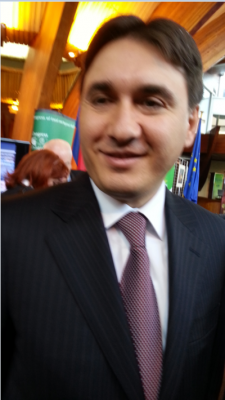
*Strasbourg/CoE/Angelo Marcopolo/- Invited to speak on a large variety of issues examined by the Congress of Local and Regional Authorities of Europe (CLRAE), during its Autumn 2013 PanEuropean Session, from Economy up to Roma People, Self Administration, Culture and/or Political Extremism, etc., COE's Acting Chairman-in-Office, Deputy Prime Minister of Armenia, and Minister of Territorial Administration, Armen Gevorgyan, replying to an "EuroFora"s Question, stressed that, in his personal view, the main point is "Local Democracy" :
- "For me, Local Democracy is the most Important of all !", among various other CLRAE issues, underlined the Armenian Deputy Prime Minister, smiling to "EuroFora".
- Particularly when "fostering Democratic societies", and "strengthen European standards on Human Rights and on the Rule of Law"; are two among the four "Priorities of the Armenian Chairmanchip of the CoE" as he recalled earlier.
- Indeed, "further Develop Local Democracy", "given its role in Modern Europe and the CoE's Agenda", is a "Major Priority", already from the previous, Andorran, as well as it "will be (also) for (the forthcoming) Austrian" Agenda, "with whom the Armenian (CoE) Chairmanship shares Common Prioriies", as Gevorgyan observed in this regard.
- Already, "2 important Conferences", recently organized "on Participatory Democracy at Local Level", and on the "Challeng" of "Making a MetroPolis Citizen-Friendly", "provided an opportunity to reflect on how the Local Authorities can become Closer to the citizens and ensure their Increased Participation in the Decision Making Processes with regard to the local and regional issues", as well as "to Exchange Ideas about (how) the Capitals, as socio-Economic driving forces, Public Solidarity ...and ...model of ..Civic Participation" which "generate Challenges conditioned by Intensive economic developments, ..... should ensure a(n) Urban Environment ...for Human Habitat focused on the Citizen", as he said previously in his Speech to CLRAE's Plenary.
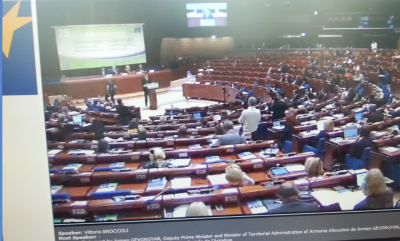
The 1st gave "Benchmarks for further Development of Participatory Democracy ....and ...for Dissemination of Principles ... as well as for Implementing them", where, "New Mechanisms for Citizens’ Participation in local Government, is especially Important given the ....Technological progress of Today", ... with "New ....Opportunities ...for Formulating a Collective Opinion ....and for making local Authorities Listen to that", by "mov(ing) forward with the Principles of local Self-Governance and ...Effective ...Model(s) ... for Practical application". The 2nd, concerning "Capitals of CoE member States", from such points of view as, f.ex., "Environment protection; ... Urban Development.... ; Infrastructure Efficiency; as well as ...public interest(s) Compatibility", focused on "Solutions" for the "Organization" of ...cities with Extra-Dense Habitation", he noted.
=> - In this regard also, "Decentralisation (is) at a Crossroads" Today in Europe, as it will be stressed at a forthoming landmark Strasbourg's seminar; co-organised by CLRAE's President Herwig Van Staa, together with the Council of European Municipalities and Regions (CEMR)'s President Wolfgang Schuster, on the History of respectively 60 and 25 Years since the adoption of the "European Charter of Municipal Liberties" (1953) and the entry into force of the "European Charter of Local Self-Government" (1988).
Significantly, the event is placed at the eve of CoE's 2nd Annual "World Forum for Democracy", scheduled for the end of November 2013, which focuses, this Year, on Exploring the manifold Potential of New Information and Communication Technologies in the ReVitalisation of Citizens' active Participation to old and new Democratic Institutions.
+ In this wider Framework, it's Interesting to note that, already, right from the Start, CoE's Charter of Local Self-Government, had conceived Local Democracy as a way to find a "Level" where the General "Right of Citizens to Participate in the conduct of Public Affairs", as "one of the Democratic Principles .. shared by all CoE's Member States", "can be Most Directly Exercised", as the PanEuropean Charter of LocalSelf-Government states in its Preambule.
That's one more reason for which CoE Charter's Article 3, §2 clearly stated that, the provisions for Elected Assemblies of Local Representatives, don't exclude at all, nor even "affect", an eventual "recourse to Assemblies of Citizens, Referendums, or Any Other Form of Direct Citizen Participatoin , where it is permitted by Statute".
In consequence, CLRAE, ", through the different labs that it will sponsor during the" World Democrady "Forum", which is dedicated into "“Re‐wiring Democracy" by: "Connecting Institutions and Citizens in the Digital Age”, "intends to contribute "to the various debates", by "identify(ing) ..the actions, which ...will ensure their effective Involvement in the local processes", but will also "Curtail their possible Misuse for purposes contrary to the values of Human rights, Democracy and the rule of Law"; as he said to CLRAE's Plenary, speaking as Acting Chairman of CoE's Committee of Ministers.
WFD's wider aim is to face "a Decline in .. Participation, .. often viewed as a Symptom of Detachment between Citizens and Institutions", by examining the Potential of "Social media and ...networks enabl(ing) individuals to ...act and interact with Politicians ...Outside institutional systems", and by "bring(ing) together elected Politicians and civil Society leaders to discuss the impact of this technological change on Established Democratic... institutions”, as Gevorgyan noted.
----------------------------------------
+ All this doesn't mean that CoE's Chairman-in-office, Armenian Deputy Priime Minister, Gevorgyan, would not be interested also to certain other important issues, related to CLRAE, including, among various others, also of potential "Cultural Routes"' links between CoE Member States' Cities and/or Regions with interrelated "Historic Cultural Heritage", f.ex., an idea that he "certainly support(s)", as he told "EuroFora".
--------------------------------------
But, Questioned earlier Today by several CLRAE Representatives from various Political and National Horizons, about "Monitoring" CoE's 47 Member States' compliance with the Principles of Local/Regional Self Administration, Gevorgyan, speaking officially as CoE's Committee of Ministers' (the PanEuropean Organisation's Highest Political body) Chairman-in-Office, also stressed that this made of CLRAE a "very Important instrument".
- Particularly when the "Format" of CLRAE's Monitoring can Never be accused of eventually being "Discriminatory", if it is "Applied Evenly to All its Member Countries", including in those who can be largely engaged on a "Post-Monitoring Dialogue", which can be an "Important" means for "Local and Regional Reforms", as well as in order to "respond to New Challenges", as he added later-on.
Gevorgyan's move Timely came at the same CLRAE Session during which the President of its Monitoring Committee, Swedish representative Lars O Molin, is presenting Tomorrow a Threefold Report on "Updating Key Texts on Monitoring and Election Obsevation Activities", in a consolidated form, extending from Votes' checking, up to Visits for Monitoring COE Member States' Obligations and Commitments through Full Regular or Specific only Reports, eventually also "Fact-Finding Missions", added to "Post-Monitoring", etc.
--------------------------
+ A fortiori when, as far as it concerns also the overall developments in Strasbourg's PanEuropean Organisation for Human Rights, Democracy and Rule of Law's main Role in General, "Now, it's Important to Ensure a Full and Complete Implementation" of its Standards and Values, by "ReInforcing all Monitoring Mechanisms", whose "Full Potential has Not Yet been Explored", including f.ex. the Charter of Local Self-Administration, which is one of "CLRAE's Key Assets", as CoE's Secretary General, Thornbjorn Jagland from Norway, stressed Today, launching a Call to "Improve the Follow-up of Monitoring" procedures, and to forge a "Joint Vision" enabling an efficient "Coordinated Action of various Monitoring Bodies" of the CoE.
In this regard, some among the "Hotter" Topical Issues that CLRAE has to face Today, are obviously the continuing Pre-Trial Imprisonment of some 2.000 Kurdish Mayors and other Elected Local or Regional Represetatives in Turkey, since 2009, as a Question raised by a Collegue during Van Staa's Press Conference, earlier Today, reminded, as well as, inside EU area, the persisting Threats of up to 3 Years Jail, Heavy Fine and/or Dismissal, against French Mayors who protest, on the basis of their Freedom of Conscience, vis a vis the Obligation, imposed to them by the current "Socialist" Government, to Personaly celebrate Same Sex Marriages, which could now be followed even by "Adoption" of Childrens by Homosexuals, largely Unpopular, (See specific NewsReports), etc.
---------------------------------------
(../..)
***
("DraftNews", as already sent earlier to "EuroFora"s subscribers/donors. A more accurate, Ful Final Version, might be published asap]
***
Main Menu
Home Press Deontology/Ethics 2009 Innovation Year EU endorses EuroFora's idea Multi-Lingual FORUM Subscribers/Donors FAQs Advanced search EuroFora supports Seabird newsitems In Brief European Headquarters' MAPs CoE Journalists Protection PlatformBRIEF NEWS
- 00:00 - 02.06.2021
- 00:00 - 18.10.2020
- 00:00 - 19.06.2020
- 00:00 - 18.05.2020
- 00:00 - 20.04.2020
- 00:00 - 02.02.2020
- 00:00 - 09.12.2019
- 00:00 - 27.11.2019
- 00:00 - 16.11.2019
Popular
- Yes, we could have prevented Ferguson riots says World Democracy Forum's Young American NGO to ERFRA
- Spanish People Elect CenterRIGHT Majority with 1st Party and Total of 178 MPs (6 More than the Left)
- Pflimlin's vision
- The European Athletic "Dream Team", after Barcelona 2010 Sport Championship Results
- Source Conseil d'Europe à ERFRA: Debatre Liberté d'Opposants à Loi livrant Mariage+Enfants à Homos ?
- Head of BioEthics InterGroup, MEP Peter Liese : "Embryonic stem cell research reaching its END" !?
- Spain: Jailed Turkish Terror suspect with Explosive,Drones,Chechen accomplices stirs Merah+ Burgas ?
- UN Head Ban Ki Moon at CoE World Democracy Forum : - "Listen to the People !"
Latest News
- Test Photos (f.ex.+ Invit to EU + Korea Peace meeting)
- EUOmbudsmen Conference 2022: Digital Gaps affect People's Trust threaten EF Project on EU Future ?
- French Election : Black Out on Virus, but Obligation for Fake 'Vaccines" Challenged
- Both French Presidential Candidates point at "Humanism" in crucial times...
- France : Zemmour = Outsider may become Game Changer in Presidential + Parliamentary Elections 2022
Statistics
Visitors: 60909247Archive
Login Form
Other Menu
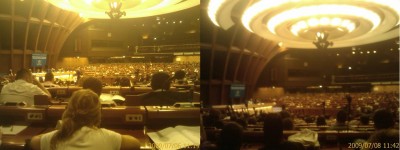
The recent paradox of freezing EU Talks with front-runner Croatia, while continuing controversial EU - Turkey talks, despite Zagreb's acceptance of Refugees' Human Rights to return, that Ankara refuses fex. in Cyprus, while both have "Good Neighborhood" problems vis a vis Slovenia, or Greece, Cyprus and Armenia respectively, can it be justified by the non-fullfilment of EU criteria, as Slovenia says, or, is it "Double Standards" ?
The question became unavoidable after statements by Presidents of Slovenia and Croatia, Tuerk and Mesic, respectively, to "EuroFora", exclusively or among Strasbourg's journalists this week at the CoE, on the sidelines of its 2009 Summer University for Political Schools, which topically brought them together as successive key-note speakers.
Comming only a few Months before EU checks Turkey's compliance to its commitments on Cyprus, etc., scheduled for December 2009, this obviously has a special importance for the coherence of EU Enlargement's principles.
Suspension of EU Negotiations is a normal consequence in case of a Candidate Country's failure to fullfil EU Conditions, such as "Good Neighborhood relations", stressed at first Slovenian President Danilo Tuerk, current CoE's chair.
But, regarding EU's Criteria, there shouldn't be any "Double Standards", reacted Croatian President Stjepan Mesic, commenting the fact that Turkey's controversial EU negotiations continue, while they were recently "freezed" in the case of Croatia, an "unquestionably European Country", which oficially accepts to respect Refugees Human Rights, contrary to Ankara's notorious refusals or reluctance.
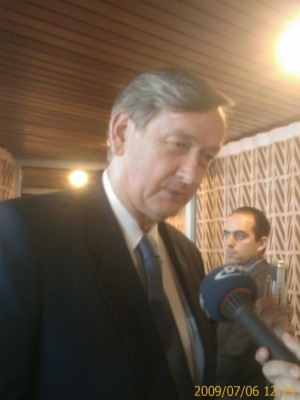
Questioned earlier what "consequences on EU's Enlargement policy" can have the "Ban on EU Membership Negotiations", imposed to Croatia, Tuerk replied that "this question comes down to the fulfillement of (EU) Criteria for membership. One has to look at each Candidate Country ., from the point of view whether it fullfils the Criteria that EU has set. One of them are Good Neighborhood Relations, I'd like to remind. And also, there are other factors, such as Justice, Home affairs, Rule of Law, and others".
- "Now, ..Candidate Countries are at Different Levels of fulfillement of Criteria", he observed.
- " Croatia is obviously the closest to that. I'm rather optimistic : I think that in the coming Months we'll have an opportunity to look at all these issues constructively and hopefully we'll be able to make progress". "My main concern, at this point, is the situation in Bosnia : We haven't seen enough progres domesticaly. We haven't seen enough during ..political parties within their country.We need a New Energy, a new energetic move towards the Candidature for EU membership. "Other (Western Balkan) Countries (Serbia, Montenegro, FYROM, Albania) have been making soaring Progress, and I think that they should be ready, in a few Years, for the Candidate status".
- "As far as the Western Balkans are concerned, .. nobody should be left outside" the EU, Slovenian's President concluded, ommitting to mention Turkey's controversial EU bid.
- "This process may be seen as Slow, but.. Slovenia has also has also been exposed to various "Booms of Slowness" in our accession period. But now we can say that the process was relatively quick, because changes which occur after becoming EU member, are quite large, and they require proper Preparations before the (EU) membership becomes a new factor, an impacting line for a new (EU) member country".
----------------------------
EU "Solidarity" ?
------------------------------
Slovenian statements made some participants from certain 3rd Countries as FYROM, etc. claim that "the Principle of EU Solidarity" would "produce a.. rising European Union Nationalism (sic !), against Non-EU Countries", as they said, asking unhappy foreign countries to form a "bloc" to exert pressure on the EU...
But Croatian President Stjepan Mesic dismissed that, supporting "EU Integration", "after the Economy also in Political" issues, as "the achievement" of our times. In EU there is "diversity, but it's United", he stressed, "EU has to be United so that it can become a central factor of Peace" also at the surrounding areas, he replied.
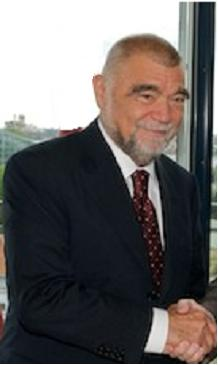
Speaking later exclusively to "EuroFora", the experienced twice President of Croatia, former President of the International "Non-Aligned" movement, denounced "Double Standards" in the way EU treats recently Croatia compared to Turkey :
- "I think that there shouldn't be Double Standards", stressed the Croatian President, in reply to a Question comparing the freeze of EU - Croatia talks, with the continuation of EU - Turkey talks, despite the fact that Croatia is an "unquestionably European country", while Turkey's EU bid is notoriously controversial.
Mesic was reacting to the observation that, even if he confirmed his "respect of Refugees' Human Rights to return, etc. (See infra), nevertheless, EU talks are suspended with Croatia.. While for oher, controversial candidates, who refuse to respect Refugees' Rights to return, etc., as fex. Turkey does in occupied Cyprus and elsewhere, EU negotiations continue".
- "I believe that Croatia's accession will confirm that all European Countries who fulfill all of the Conditions and achieve European Standards, have to join the EU. There shouldn't be any Double Standards", went on to add in reply President Mesic.
In this relation, Croatia's President found "of paramount importance", CoE's "mechanisms enforcing ECHR's judgements"
- "On Refugees and Displaced persons, the process will be completed only after the last person demanding to return will be allowed to do so !", President Mesic Croatia stressed earlier, setting a general standard of obvious importance also for otherr candidates, as f.ex. Turkey, often accused to exclude or heavily restrict Greek Cypriot Displaced persons' return to their Family Homes and ancestral land, provoke difficulties to Turkish-Kurd IDPs return to their home regions at the South-East, etc.
Some "2.000 People are still reported Missing" in former Yugoslavia, for some Years, (as in Cyprus, modern Europe's oldest case, for 3 Decades. Nagorno-Karabach, Tcecnya in Russia, etc, more recently), and Investigations "will only be completed after establishing the fate of the last one of them", he added.
Speaking earlier on "War Crimes", President Mesic stressed that "Leaders are responsible for (the) Wars (of the Past), not the People", and called against Impunity : "Individuals have to be held Responsible for Crimes. International Penal Tribunals have to persecute those individuals", perpetrators of War Crimes, he underlined.
Such statements naturally made Mesic rather popular at ECHR, whose President, French EuroJudge, Professor Jean-Paul Costa, looked particularly smiling when he welcomed him later on Wednesday afternoon, after Slovenian President Daniko Tuerk earlier this week.


















